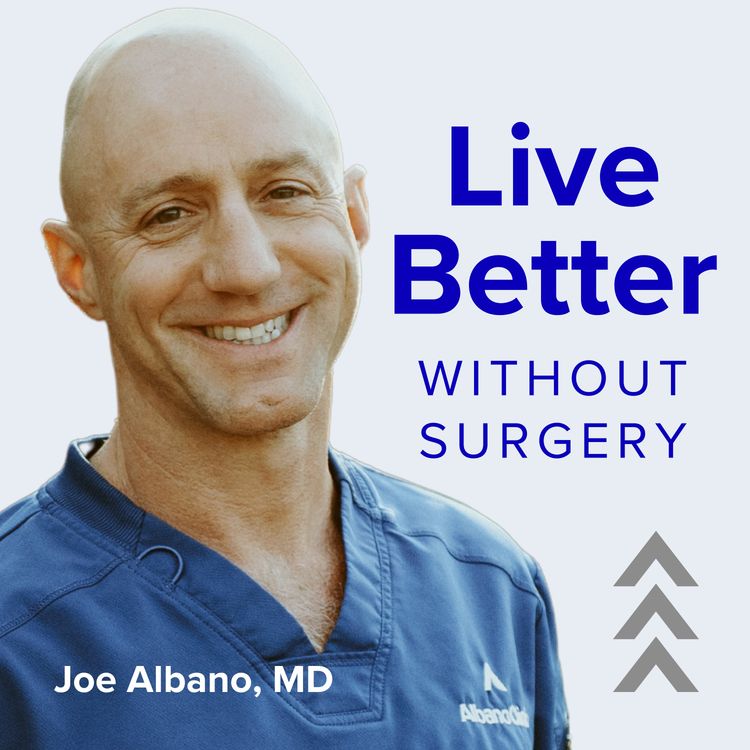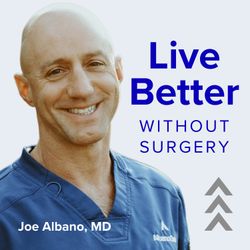Share

Live Better Without Surgery with Joe Albano, MD
The Terrible, Horrible, No Good, Very Bad Meniscus Surgery
Meniscus surgeries are among the most common orthopedic procedures performed today — but do they really work?
In this first episode of Live Better Without Surgery, Dr. Joe Albano dives into why he calls it the “terrible, horrible, no good, very bad meniscus surgery.” Drawing from his medical training, peer-reviewed research, and years of experience in regenerative orthopedics, Dr. Albano breaks down what’s wrong with the standard surgical approach — and how advanced orthobiologic treatments like PRP, bone marrow, and fat tissue therapy can offer better outcomes and faster recovery.
In this episode, you’ll learn:
✅ Why the “gold standard” meniscus surgery often fails long-term
✅ The connection between meniscus tears, inflammation, and arthritis
✅ The shocking research comparing surgery vs. physical therapy or even sham surgery
✅ What makes regenerative orthopedics a smarter, safer alternative
✅ How ultrasound-guided, cell-based therapies support true healing
Interested in learning more about how to live better without surgery?
⏬ CONNECT WITH US ⏬
🔹 Website: https://albanoclinic.com/
🔹 YouTube: https://www.youtube.com/@drjoealbano
🔹 TikTok: https://tiktok.com/@drjoealbano
🔹 Instagram: https://instagram.com/drjoealbano/
🔹 Facebook: https://facebook.com/drjoealbano/
🔹 LinkedIn: https://linkedin.com/in/joe-albano-md/
More episodes
View all episodes

9. Peptides Explained: What They Are, How They Work & Are They Safe?
11:16||Ep. 9Peptides are one of the most talked-about topics in wellness, weight loss, and recovery today—but what’s hype and what’s real?In this episode of Live Better Without Surgery, Dr. Albano breaks down:✅ What peptides actually are (and why they’re not all the same)✅ The role of peptides in weight loss, inflammation, recovery, sleep, and longevity✅ Which peptides show promise for orthopedic conditions like arthritis✅ The difference between safe, physician-guided use vs. risky online sources✅ The importance of lifestyle first: sleep, diet, hydration, supplements, and exerciseInterested in learning more about how to live better without surgery?⏬ CONNECT WITH US ⏬🔹 Website: https://albanoclinic.com/🔹 YouTube: https://www.youtube.com/@drjoealbano🔹 TikTok: https://tiktok.com/@drjoealbano🔹 Instagram: https://instagram.com/drjoealbano/🔹 Facebook: https://facebook.com/drjoealbano/🔹 LinkedIn: https://linkedin.com/in/joe-albano-md/
8. Why Be Normal?
36:50||Ep. 8Do your labs say you’re “normal,” but you still feel tired, foggy, or not like yourself?In this episode, Dr. Joe Albano sits down with Merin Kinikini, DNP, NP, RD, to explore why “normal” doesn’t always mean optimal—and how bioidentical hormone replacement therapy (BHRT) could be the missing link in your wellness journey.In this episode you'll learn:✅ The difference between “normal” and “optimal” hormone levels✅ Why BHRT is foundational to regenerative medicine✅ Common symptoms of hormone imbalance in men and women✅ How compounding pharmacies personalize treatment✅ The long-term benefits of hormone optimization for brain and bone health✅ What to expect from the BHRT process at Albano ClinicYou don’t have to settle for “fine.” If your labs are normal but you still feel off, it might be time to consider hormone optimization.⏬ CONNECT WITH US ⏬🔹 Website: https://albanoclinic.com/🔹 YouTube: https://www.youtube.com/@drjoealbano🔹 TikTok: https://tiktok.com/@drjoealbano🔹 Instagram: https://instagram.com/drjoealbano/🔹 Facebook: https://facebook.com/drjoealbano/🔹 LinkedIn: https://linkedin.com/in/joe-albano-md/
7. Whole-Body Wellness: The Synergy of Hormones, Muscles, and Weight Loss
20:37||Ep. 7In this episode, Dr. Joe Albano shares how a whole-body wellness approach helps patients heal faster, perform better, and age more powerfully.Instead of treating symptoms in isolation, Dr. Albano explains how hormone optimization, muscle strengthening, and weight management work together to support regenerative healing — particularly after 40.You’ll learn how bioidentical hormone replacement therapy (BHRT), Emsculpt NEO, and GLP-1 medications like semaglutide or tirzepatide fit into a comprehensive plan for movement, recovery, and vitality.You’ll learn:✅ Why peptides are one of the most talked-about topics in wellness and recovery✅ What peptides actually are (and why they’re not all the same)✅ How they support weight loss, inflammation control, recovery, sleep, and longevity✅ Which peptides show promise for orthopedic conditions like arthritis✅ The difference between safe, physician-guided use vs. risky online sources✅ Why lifestyle optimization—sleep, diet, hydration, and movement—comes firstInterested in learning more about how to live better without surgery?⏬ CONNECT WITH US ⏬🔹 Website: https://albanoclinic.com/🔹 YouTube: https://www.youtube.com/@drjoealbano🔹 TikTok: https://tiktok.com/@drjoealbano🔹 Instagram: https://instagram.com/drjoealbano/🔹 Facebook: https://facebook.com/drjoealbano/🔹 LinkedIn: https://linkedin.com/in/joe-albano-md/
6. Regenerate, Restore, Reconnect: Beyond ED Treatments
18:21||Ep. 6Erectile dysfunction (ED) affects millions of men over 40, but it doesn’t have to define your life or intimacy. In this episode of Live Better Without Surgery, Dr. Joe Albano explores innovative, non-surgical approaches to reclaiming confidence and improving sexual health.Dr. Albano discusses the science behind regenerative treatments like PRP (platelet-rich plasma), low-intensity shockwave therapy, and even intracavernosal Botox. He explains how these therapies can restore vascular health, improve nerve function, and work synergistically to enhance erectile function — all without relying solely on medications.This episode is part of the Albano Clinic’s holistic approach: optimizing hormone balance, managing weight, and supporting overall wellness to improve both your joints and sexual health.You’ll learn:✅ What causes erectile dysfunction and why it’s so common over 40✅ How PRP injections support blood flow and tissue repair✅ The benefits of low-intensity extracorporeal shockwave therapy✅ How intracavernosal Botox can enhance erection quality✅ Why combining multiple regenerative therapies often works better than using one alone✅ The connection between overall health, joint healing, and sexual performanceResources:1. PRP Safety and Efficacy:● Is Platelet Rich Plasma Safe and Effective in Treatment of Erectile Dysfunction? Randomized Controlled Study● Platelet-rich Plasma for the Treatment of Erectile Dysfunction: A Prospective, Randomized, Double-blind, Placebo-controlled Clinical Trial2. ECSW:● Shockwave treatment of erectile dysfunction● Effectiveness of Low-Intensity Extracorporeal Shock Wave Therapy in Erectile Dysfunction: An Analysis of Sexual Function and Penile Hardness at Erection: An Umbrella Review3. Botox Safety:● Long Term Effectiveness and Safety of Intracavernosal Botulinum Toxin A as an Add-on Therapy to Phosphosdiesterase Type 5 Inhibitors or Prostaglandin E1 Injections for Erectile DysfunctionInterested in learning more about how to live better without surgery?⏬ CONNECT WITH US ⏬🔹 Website: https://albanoclinic.com/🔹 YouTube: https://www.youtube.com/@drjoealbano🔹 TikTok: https://tiktok.com/@drjoealbano🔹 Instagram: https://instagram.com/drjoealbano/🔹 Facebook: https://facebook.com/drjoealbano/🔹 LinkedIn: https://linkedin.com/in/joe-albano-md/
5. Weight Loss Unplugged: Real Talk on Tirzepatide and Living Better
19:09||Ep. 5Why are medications like tirzepatide (Mounjaro® / Zepbound®) suddenly everywhere — and do they really work?In this episode of Live Better Without Surgery, Dr. Joe Albano breaks down what’s real and what’s hype about today’s most talked-about weight loss drugs. He explains how these medications can help people lose stubborn fat, reduce pain, and even improve results from regenerative treatments like PRP and stem cells.Dr. Albano also shares the core philosophy behind the Albano Clinic’s approach: lasting results require more than a prescription — they require movement, mindful nutrition, and hormone optimization to help your body function at its best.You’ll learn:✅ How GLP-1 medications like tirzepatide actually work✅ The connection between body weight, joint pain, and inflammation✅ Why “move more, eat less” sometimes stops working — and what to do next✅ How optimizing hormones like thyroid supports weight loss✅ The risks of muscle loss — and how to prevent it with strength training and protein✅ When short-term medication use can be the “kickstart” you need to change habitsInterested in learning more about how to live better without surgery?⏬ CONNECT WITH US ⏬🔹 Website: https://albanoclinic.com/🔹 YouTube: https://www.youtube.com/@drjoealbano🔹 TikTok: https://tiktok.com/@drjoealbano🔹 Instagram: https://instagram.com/drjoealbano/🔹 Facebook: https://facebook.com/drjoealbano/🔹 LinkedIn: https://linkedin.com/in/joe-albano-md/
4. Kickin' Out the Bad Guys: The Importance of Regular Maintenance After Orthobiologics
14:39||Ep. 4You change your oil — but do you maintain your joints?In this episode of Live Better Without Surgery, Dr. Joe Albano breaks down why ongoing maintenance is essential for managing osteoarthritis — even after you’ve had regenerative treatments like PRP, bone marrow, or fat injections.He explains why osteoarthritis can’t be “cured,” how insurance-driven medicine shapes your options, and how annual treatments can help you stay active, mobile, and pain-free for the long term.You’ll also hear Dr. Albano’s signature analogies — from Star Trek to “calling cousin Joey” — that make complex orthopedic science simple (and fun) to understand.You’ll learn:✅ Why there’s still “no cure” for osteoarthritis (and what that really means)✅ The difference between symptom management and regeneration✅ How PRP, bone marrow, and fat injections help keep inflammation in check✅ Why maintenance treatments matter — like an annual oil change for your knees✅ What insurance covers (and doesn’t) — and why that matters for your careInterested in learning more about how to live better without surgery?⏬ CONNECT WITH US ⏬🔹 Website: https://albanoclinic.com/🔹 YouTube: https://www.youtube.com/@drjoealbano🔹 TikTok: https://tiktok.com/@drjoealbano🔹 Instagram: https://instagram.com/drjoealbano/🔹 Facebook: https://facebook.com/drjoealbano/🔹 LinkedIn: https://linkedin.com/in/joe-albano-md/
3. From Myths to Medicine: Avoid the Snake Oil Salesman
15:43||Ep. 3What’s really inside those “stem cell” injections you see advertised everywhere?Dr. Joe Albano breaks down the myths, marketing hype, and medical facts behind regenerative treatments — so you can make confident decisions about your health.In this episode of Live Better Without Surgery, you'll learn:✅ What “stem cells” really are — and why most treatments don’t contain any live cells✅ The difference between autologous and allogeneic regenerative sources✅ How to spot misleading marketing claims in stem cell advertising✅ Why guidance and physician experience matter for injection success✅ Questions to ask before choosing a regenerative providerInterested in learning more about how to live better without surgery?⏬ CONNECT WITH US ⏬🔹 Website: https://albanoclinic.com/🔹 YouTube: https://www.youtube.com/@drjoealbano🔹 TikTok: https://tiktok.com/@drjoealbano🔹 Instagram: https://instagram.com/drjoealbano/🔹 Facebook: https://facebook.com/drjoealbano/🔹 LinkedIn: https://linkedin.com/in/joe-albano-md/
2. The ABCs of Regenerative Orthopedics: Cells that Heal
27:19||Ep. 2Welcome back to Live Better Without Surgery with Dr. Joe Albano — a podcast about using regenerative medicine to help your body heal, perform, and thrive without surgery.In this episode, Dr. Albano explains what regenerative orthopedics really is, the types of healing cells your body uses, and how treatments like PRP, bone marrow, and fat-derived cell therapy can help restore function naturally.In this episode, you’ll learn:✅ What regenerative orthopedics actually means — and why it’s changing modern medicine.✅ The difference between autologous (from you) and allogeneic (not from you) cells.✅ How PRP, bone marrow, and fat-derived therapies accelerate recovery and repair.✅ Why steroids and insurance-driven treatments can slow true healing. ✅ How regenerative medicine empowers your body to heal itself.Interested in learning more about how to live better without surgery?⏬ CONNECT WITH US ⏬🔹 Website: https://albanoclinic.com/🔹 YouTube: https://www.youtube.com/@drjoealbano🔹 TikTok: https://tiktok.com/@drjoealbano🔹 Instagram: https://instagram.com/drjoealbano/🔹 Facebook: https://facebook.com/drjoealbano/🔹 LinkedIn: https://linkedin.com/in/joe-albano-md/